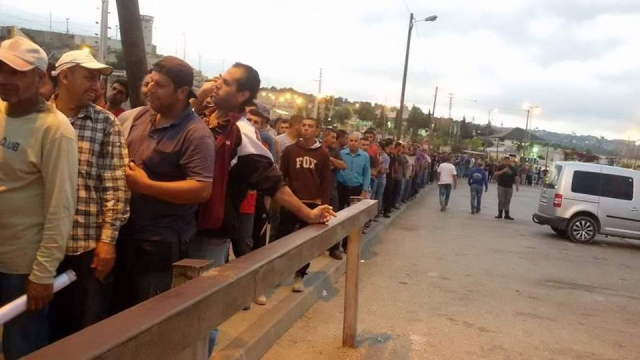Israel High Court justices, Yitzhak Amit, Anat Brotan, and Ruth Ronan, rejected the petition of the Benjamin Regional Council, which demanded the cancellation of the outgoing government's decision to increase the quota of Palestinian Authority resident workers crossing into Israel.
In the territory that is part of the Binyamin Council, there are four border crossings, two of which, the Hasmonaim crossing and the Qalandiya crossing, are crossed every morning by thousands of Palestinian workers on their way to work in Israel. According to the council, the crossings are already packed every morning and heavy traffic jams are created daily, harming the quality of life for residents. The council further claimed that increasing the quota would create a significant additional burden.
The petition also states that the decision to increase the quotas is not reasonable or proportionate, and was made in violation of the law while significantly harming the residents of the council and the Palestinian population that uses the crossings. Traffic at border crossings between Israel and various West Bank regions is also alarming since, in previous Palestinian uprisings, border patrol checkpoints have been primary targets of terrorism.
It is further claimed in the appeal that the situation at the crossings leads to discomfort even to the Palestinian workers who are required to leave early in the morning in order to arrive on time for their work; This is also because the traffic arrangements are not suitable for the number of vehicles passing through the place, and there is no appropriate infrastructure for the workers to wait in comfort before transporting them to their workplaces. Too often the images of Palestinians huddled en masse at checkpoints are used for propaganda to show Israel as mistreating Palestinians.
The Benjamin Council stressed that they are not opposed to Palestinian workers entering and making a living in Israel, but only demand it be done in an orderly and supervised manner so that the other residents of the council and the region are not harmed.
The Israeli justices rejected the petition from the council, on the grounds that they did not provide an adequate factual foundation to prove what was claimed in the petition, and that no "exhaustion of procedures" was carried out.
However, Justice Amit noted, "Before concluding, I would like to point out that in addition to the main relief requested, the petitioner petitioned to significantly improve the existing infrastructure at the crossings, including adding personnel, opening additional travel routes, and more. We noted before us what was said in the response of the respondents according to which the need to upgrade the infrastructure in the area is being examined by them and by other authorities, and already these days actions are being taken with the aim of easing the many existing traffic congestions in the area. It is hoped that this will be done as soon as possible."


